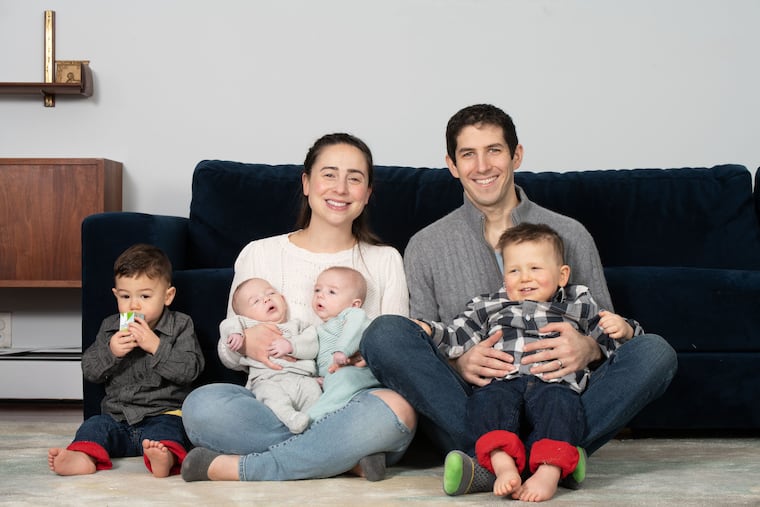Six stores, hours of searching, and only four cans of formula to feed my babies
Like many other parents, I’m terrified by what will happen if I can’t find formula.

Last November, I delivered identical twin boys, Miles and Levi. I had planned to pump breast milk, but because of their small size at birth, they had to start on high-calorie formula.
I tried to continue pumping but simply couldn’t keep up: I have two other children, Oliver and Benjamin, and our oldest, Ollie – just under 4 – has been battling a cancer of the brain and spine called atypical teratoid rhabdoid tumor since the age of 9 months. Due to the stressors of our situation, I was not producing nearly enough milk to feed both Miles and Levi. I also believe “fed is best” and felt comfortable with my decision to switch to formula.
We signed up for a subscription for a case of Enfamil NeuroPro 20.7-ounce powder cans delivered to our home every two weeks, at a cost of $157 per order. It’s been wonderful: Miles and Levi have both more than doubled their body weight by 6 months old and need to stay on it until they are 1 year old.
Then, Enfamil started canceling our order.
The first time was about a month ago. They said it was a manufacturing problem, and wouldn’t happen again; after we called, concerned, Enfamil fulfilled our order at no cost. While the cancellation was worrisome, we appreciated their response, and were reassured.
Then on May 12, as my husband, Max, was driving us home after a surgery to revise the shunt in Ollie’s brain, I checked my email and saw that our formula subscription was once again canceled.
After a combined four hours on the phone, mostly on hold, my husband and I were told that the company had no formula to send but could instead give us a coupon and send two samples – once they became available in three weeks or so. A supervisor was supposed to call us the next day; we still have not heard back.
That night I drove to six pharmacies but managed to purchase only four cans, enough for less than a week. My husband sent an email to about 30 family and friends, imploring: “If anyone is in a store, can you please check for and buy Enfamil infant formula? We’ll pay you back.”
» READ MORE: The baby formula shortage can really suck
Thankfully our email call for help was successful – our network rallied and went looking for formula, and helped us accumulate enough to keep our infants fed for two more weeks. But what happens then?
In thousands of stores nationwide, 40% of infant formula is out of stock, due to ongoing supply issues and a recent recall. We recognize our good fortune. Many families looking for formula right now do not have the networks, time, or finances to gather enough to last two days, let alone two weeks. Half of the families who buy infant formula in the United States are low-income and use federal WIC benefits, and these children will be left most vulnerable in this shortage.
It is also not lost on us that there is a jarring juxtaposition between the formula shortage and the probable overturning of Roe v. Wade. It feels as if our society stops caring about babies once they are born.
For the last three years, we have seen how little children are prioritized, and this formula crisis is another dire example. Since 2019, when our son was diagnosed with cancer, Max and I have seen firsthand how toxic, outdated treatments and the lack of funding for pediatric cancer research have impacted Ollie’s prognosis while also leaving him with many secondary complications like difficulties walking, talking, and eating by mouth. Pediatric cancer is the leading cause of death by disease in children in the United States, yet less than 4% of funding from the National Institutes of Health goes to pediatric cancer. We have four children under 4 years of age who are not yet eligible to get vaccinated against COVID-19, including Ollie, who is severely immunocompromised. Despite this, mask mandates are being lifted all over the country with cases rising, leaving our children vulnerable.
It is both frightening and inhumane that our government is almost certainly about to take away the right to choose whether to continue a pregnancy, when it seemingly does little to care for the children already here. This formula crisis is a very real threat to the health and safety of infants around the country.
We are just one of the many families who are very scared. We must all do better for our children.
Rachel Krieger is a family nurse practitioner and holds an advanced degree in public health. She and Max live outside Philadelphia and are cofounders of Ollie’s Orchestra, a nonprofit that brings music to children living with and fighting cancer and that supports research for pediatric brain cancer.